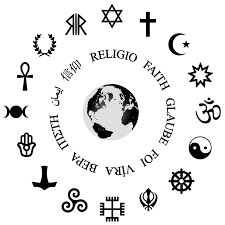 |
| Religious symbols. |
Religions
Religion is a social-cultural system of designated
behaviors and practices, morals, worldviews, texts,
sanctified places, prophecies, ethics, or organizations,
that relates humanity to supernatural, transcendental,
and spiritual elements. However, there is no scholarly
consensus over what precisely constitutes a religion.
Different religions may or may not contain various
elements ranging from the divine, sacred things, faith,
a supernatural being or supernatural beings or "some
sort of ultimacy and transcendence that will provide
norms and power for the rest of life". Religious
practices may include rituals, sermons, commemoration or
veneration (of deities and/or saints), sacrifices,
festivals, feasts, trances, initiations, funerary
services, matrimonial services, meditation, prayer,
music, art, dance, public service, or other aspects of
human culture. Religions have sacred histories and
narratives, which may be preserved in sacred scriptures,
and symbols and holy places, that aim mostly to give a
meaning to life. Religions may contain symbolic stories,
which are sometimes said by followers to be true, that
have the side purpose of explaining the origin of life,
the universe, and other things. Traditionally, faith, in
addition to reason, has been considered a source of
religious beliefs.
There are an estimated 10,000 distinct religions
worldwide. About 84% of the world's population is
affiliated with Christianity, Islam, Hinduism, Buddhism,
or some form of folk religion. The religiously
unaffiliated demographic includes those who do not
identify with any particular religion, atheists, and
agnostics. While the religiously unaffiliated have grown
globally, many of the religiously unaffiliated still
have various religious beliefs.
The study of religion encompasses a wide variety of
academic disciplines, including theology, comparative
religion and social scientific studies. Theories of
religion offer various explanations for the origins and
workings of religion, including the ontological
foundations of religious being and belief. |
|
Definition
Scholars have failed to agree on a definition of
religion. There are, however, two general definition
systems: the sociological/functional and the
phenomenological/philosophical.
Modern Western
The concept of religion originated in the modern Western
era. Parallel concepts are not found in many current and
past cultures; there is no equivalent term for religion
in many languages. Scholars have found it difficult to
develop a consistent definition, with some giving up on
the possibility of a definition. Others argue that
regardless of its definition, it is not appropriate to
apply it to non-Western cultures.
An increasing number of scholars have expressed
reservations about ever defining the essence of
religion. They observe that the way we use the concept
today is a particularly modern construct that would not
have been understood through much of history and in many
cultures outside the West (or even in the West until
after the Peace of Westphalia). The MacMillan
Encyclopedia of Religions states:
The very attempt to define religion, to find some
distinctive or possibly unique essence or set of
qualities that distinguish the religious from the
remainder of human life, is primarily a Western concern.
The attempt is a natural consequence of the Western
speculative, intellectualistic, and scientific
disposition. It is also the product of the dominant
Western religious mode, what is called the
Judeo-Christian climate or, more accurately, the
theistic inheritance from Judaism, Christianity, and
Islam. The theistic form of belief in this tradition,
even when downgraded culturally, is formative of the
dichotomous Western view of religion. That is, the basic
structure of theism is essentially a distinction between
a transcendent deity and all else, between the creator
and his creation, between God and man. |
|
|
|
Classification
In the 19th and 20th centuries, the academic practice of
comparative religion divided religious belief into
philosophically defined categories called world
religions. Some academics studying the subject have
divided religions into three broad categories: |
- world religions, a term which
refers to transcultural, international religions;
- indigenous religions, which
refers to smaller, culture-specific or
nation-specific religious groups; and
- new religious movements, which
refers to recently developed religions.
|
|
Some recent scholarship has argued that not all types of
religion are necessarily separated by mutually exclusive
philosophies, and furthermore that the utility of
ascribing a practice to a certain philosophy, or even
calling a given practice religious, rather than
cultural, political, or social in nature, is limited.
The current state of psychological study about the
nature of religiousness suggests that it is better to
refer to religion as a largely invariant phenomenon that
should be distinguished from cultural norms (i.e.
religions). |
|